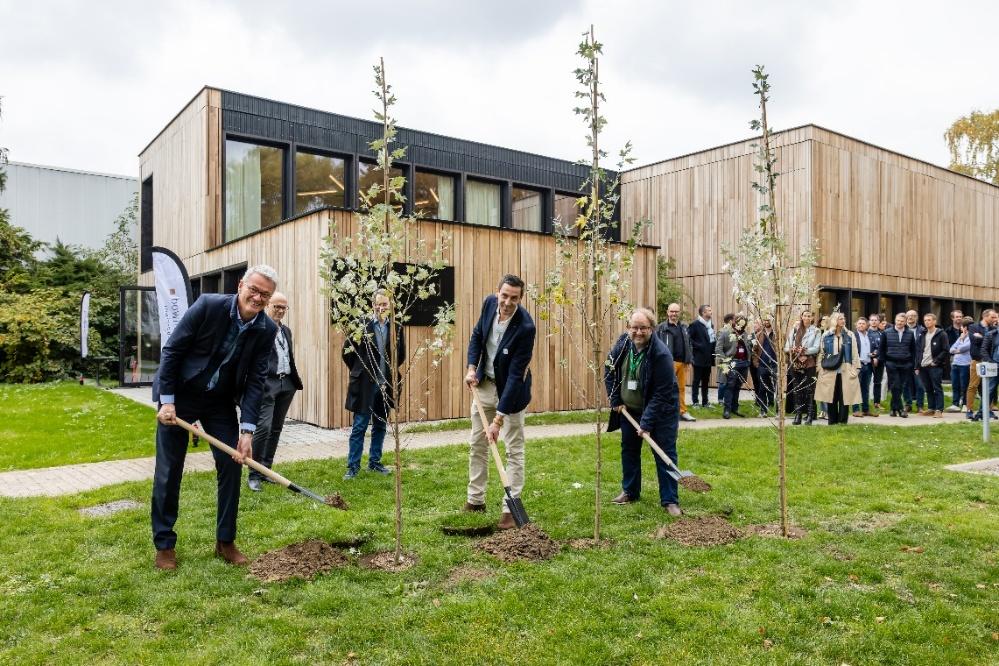“Sustainable Ephemeral”: Nhood Invests in bowhood to Redefine the Future of Responsible Real Estate

Nhood, a real estate services and solutions company committed to the sustainable transformation of territories, has partnered with bowhood to develop a new generation of temporary, modular, dismantlable, and reusable real estate solutions.
Together, the two companies inaugurated the first prototype of this partnership in Villeneuve-d’Ascq, northern France. Built from wood and glass, the bowhood solution transforms underutilized spaces into flexible living areas—such as offices, restaurants, shops, temporary housing, or collaborative spaces—through aesthetic modules that are quick to install and have a low environmental impact.
This partnership reflects a shared ambition to offer agile solutions capable of meeting both evolving uses and the environmental requirements of territories.
A Partnership Between Two Responsible Real Estate Players to Develop a New Tool for Urban Regeneration and Rational Land Use
With lifestyle changes, economic transformation of territories, and adaptation to climate change, the real estate sector—traditionally anchored in long-term projects—struggles to keep pace with today’s rapid transformations.
To address this challenge, bowhood and Nhood joined forces to propose a new generation of solutions developed from standard wooden elements and recycled materials, designed to be assembled, dismantled, and reused.
Inspired by the concept of “sustainable ephemeral,” the project spans the entire chain—from construction (wood and glass) to installation (dismantlable and reusable) and even the business model (based on leasing).
The goal is to make this tool a concrete driver of urban regeneration and sustainable land management.
An Innovative Solution with Seven Patents
Developed by bowhood, this unique solution stands out for:
Multiple uses: Structures can host offices, shops, medical clinics, temporary housing, or dining spaces.
Rapid implementation: Projects can be completed in less than three months after approval by local authorities.
Controlled environmental impact: Elements are produced from locally sourced wood, cut and processed near installation sites, avoiding centralized factories, reducing carbon footprint, and supporting regional economies.
Flexible economic model: Primarily based on leasing for agility, with purchase options currently under study.
To support this dynamic and accelerate development, Nhood invested in bowhood’s R&D, reinforcing its commitment to innovation that combines performance, flexibility, and environmental responsibility.
By 2028, the goal is to deploy over 30,000 m² in France and later expand the solution to the European market in partnership with Nhood.
Meanwhile, bowhood aims to structure an integrated wood supply chain—from forest management to assembly—strengthening short circuits and consolidating a circular, low-carbon model.
Maximum Paris and Dizy: Two Circular Design Players with a Shared Vision
To illustrate this approach to reversible, low-carbon real estate, Nhood and bowhood showcase two French leaders in circular design in their prototype: Maximum Paris and Dizy.
Both share a common vision of ecological, modular, and durable design that combines functionality and aesthetics to create sustainable, responsible spaces, giving a second life to both materials and places.
Maximum Paris, a furniture factory and architecture studio, upcycles discarded materials, creating pieces and projects from abandoned industrial materials. Among its most iconic creations are furniture made from recycled banknotes and structures built with curved glass from the Pompidou Center (Beaubourg).
Dizy, a Lille-based B Corp™ certified company, designs upcycled furniture resistant to planned obsolescence, with designs aimed at decarbonizing space planning. Each piece is designed to last, adapt, and be repairable. The brand works with public and private entities, creating custom furniture or ready-to-install solutions from demolition materials, recovered waste, old furniture, or recycled matter.
A 350 m² Wood-and-Glass Prototype Installed at Nhood’s Headquarters in Villeneuve-d’Ascq
To bring this project to life, a full-scale prototype was installed in the parking lot of Nhood’s headquarters in Villeneuve-d’Ascq.
Developed in just three months, the space—350 m² spread over two floors with a double-height ceiling—was built using wood from regional forests.
Designed to host events, meetings, and collaborative activities, this building is more than an internal space: it is an open urban laboratory, allowing municipalities, companies, and local partners to test new uses and assess the potential of ephemeral, sustainable, low-carbon real estate.
Beyond this first project, bowhood and Nhood are already exploring various initiatives, such as temporary offices during renovation works, pop-up restaurants, temporary store extensions, mobile clinics for municipalities, modular schools, or medium- and long-term residential projects.
“With bowhood, we take a natural step in Nhood’s trajectory: we enrich our real estate expertise with a flexible, modular, low-carbon solution. This strategic partner allows us to combine our know-how in urban transformation with Thibaut Leroy’s creativity, offering territories and clients an almost immediately operational and responsible product. Beyond the Villeneuve-d’Ascq prototype, we aim to expand this solution in France and Europe, strengthening our offer and anticipating new usage needs. This is how Nhood pursues its ambition: innovating to create useful and lasting value,” explains Marco Balducci, CEO of Nhood.
“Bowhood was born from a simple observation: real estate is, by nature, a long-term sector. Today, this slowness is an obstacle in the face of rapidly changing lifestyles and consumption patterns, as well as economic, climate, and political uncertainties. We needed to find a way to free the sector from its immobility, creating an agile response capable of adapting to uses, needs, and the urgency of reducing environmental impact. With Nhood, we offer a global solution that enables public and private entities to effectively address their challenges of attractiveness, economic performance, and social responsibility,” says Thibaut Leroy, founder of bowhood.

